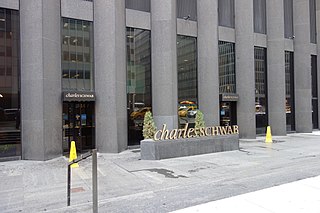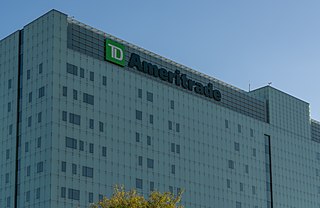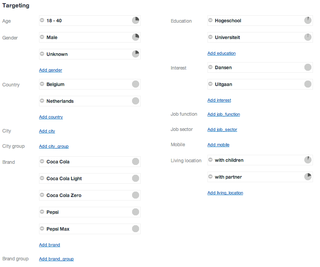
The dot-com bubble was a stock market bubble that ballooned during the late-1990s and peaked on Friday, March 10, 2000. This period of market growth coincided with the widespread adoption of the World Wide Web and the Internet, resulting in a dispensation of available venture capital and the rapid growth of valuations in new dot-com startups.

A web banner or banner ad is a form of advertising on the World Wide Web delivered by an ad server. This form of online advertising entails embedding an advertisement into a web page. It is intended to attract traffic to a website by linking to the website of the advertiser. In many cases, banners are delivered by a central ad server. This payback system is often how the content provider is able to pay for the Internet access to supply the content in the first place. Usually though, advertisers use ad networks to serve their advertisements, resulting in a revshare system and higher quality ad placement.

NYSE Chicago, formerly known as the Chicago Stock Exchange (CHX), is a stock exchange in Chicago, Illinois, US. The exchange is a national securities exchange and self-regulatory organization, which operates under the oversight of the U.S. Securities and Exchange Commission (SEC). Intercontinental Exchange (ICE) acquired CHX in July 2018 and the exchange rebranded as NYSE Chicago in February 2019.
Click fraud is a type of fraud that occurs on the Internet in pay per click (PPC) online advertising. In this type of advertising, the owners of websites that post the ads are paid based on how many site visitors click on the ads. Fraud occurs when a person, automated script, computer program or an auto clicker imitates a legitimate user of a web browser, clicking on such an ad without having an actual interest in the target of the ad's link in order to increase revenue. Click fraud is the subject of some controversy and increasing litigation due to the advertising networks being a key beneficiary of the fraud.
Yahoo! Native is a native "Pay per click" Internet advertising service provided by Yahoo.
Pay-per-click (PPC) is an internet advertising model used to drive traffic to websites, in which an advertiser pays a publisher when the ad is clicked.
Nielsen Holdings plc is an American information, data and market measurement firm. Nielsen operates in over 100 countries and employs approximately 44,000 people worldwide.

The Charles Schwab Corporation is an American multinational financial services company. It offers banking, commercial banking, investing and related services including consulting, and wealth management advisory services to both retail and institutional clients. It has over 380 branches, primarily in financial centers in the United States and the United Kingdom. It is on the list of largest banks in the United States by assets. As of December 31, 2023, it had $8.5 trillion in client assets, 34.8 million active brokerage accounts, 5.2 million corporate retirement plan participants, and 1.8 million banking accounts. It also offers a donor advised fund for clients seeking to donate securities. It was founded in San Francisco, California, and is headquartered in Westlake, Texas.
An online advertising network or ad network is a company that connects advertisers to websites that want to host advertisements. The key function of an ad network is an aggregation of ad supply from publishers and matching it with the advertiser's demand. The phrase "ad network" by itself is media-neutral in the sense that there can be a "Television Ad Network" or a "Print Ad Network", but is increasingly used to mean "online ad network" as the effect of aggregation of publisher ad space and sale to advertisers is most commonly seen in the online space. The fundamental difference between traditional media ad networks and online ad networks is that online ad networks use a central ad server to deliver advertisements to consumers, which enables targeting, tracking and reporting of impressions in ways not possible with analog media alternatives.
Online advertising, also known as online marketing, Internet advertising, digital advertising or web advertising, is a form of marketing and advertising that uses the Internet to promote products and services to audiences and platform users. Online advertising includes email marketing, search engine marketing (SEM), social media marketing, many types of display advertising, and mobile advertising. Advertisements are increasingly being delivered via automated software systems operating across multiple websites, media services and platforms, known as programmatic advertising.

iVillage, Inc. was a mass media company that operated the ”most popular female-oriented sites” on the internet in the 1990s. In addition to ivillage.com, the company operated iVillage UK, Astrology.com, GardenWeb, and the NBC Digital Health Network. The iVillage website ceased operations on October 31, 2014, and the domain name was redirected to the Today Show website, while the other domain names were sold.

TD Ameritrade was a stockbroker that offered an electronic trading platform for the trade of financial assets including common stocks, preferred stocks, futures contracts, exchange-traded funds, forex, options, mutual funds, fixed income investments, margin lending, and cash management services. The company received revenue from interest income on margin balances, commissions for order execution, and payment for order flow.
NeoEdge Networks was a Silicon Valley–based technology and in-game advertising company that enabled casual game publishers and developers to deliver television-like commercials within their products – frequently in the context of free-to-consumer casual game play. NeoEdge powered advertising for a variety of game publishers including Yahoo. NeoEdge provided both peer-to-peer game distribution and in-game advertising . It was renamed Blue Noodle in early 2011 and shut down later that year.
Comscore, Inc. is an American-based global media measurement and analytics company providing marketing data and analytics to enterprises, advertising agencies, brand marketers, and publishers.

A domain name auction facilitates the buying and selling of currently registered domain names, enabling individuals to purchase a previously registered domain that suits their needs from an owner wishing to sell. A Drop registrar offers sales of expiring domains; but with a domain auction there is no need to wait until a current owner allows the registration to lapse before purchasing the domain you most want to own. Domain auction sites allow users to search multiple domain names that are listed for sale by owner, and to place bids on the names they want to purchase. As in any auction, the highest bidder wins. The more desirable a domain name, the higher the winning bid, and auction sites often provide links to escrow agents to facilitate the safe transfer of funds and domain properties between the auctioning parties.
A direct public offering (DPO) or direct listing is a method by which a company can offer an investment opportunity directly to the public.

Targeted advertising is a form of advertising, including online advertising, that is directed towards an audience with certain traits, based on the product or person the advertiser is promoting.
Comtex News Network, Inc. is a distributor of news on the Internet, specializing in the business and financial market sectors. The company is a wholesaler of electronic real-time news and content gathered from thousands of sources, including national and international news bureaus, agencies and publications. Comtex enhances and standardizes the content received from such sources in order to provide editorially consistent and technically uniform products to its customers. Its processing includes adding stock ticker symbols, indexing by keyword and category and converting diverse publisher materials and formats into the industry standard delivery format NewsML, an XML derivative.
Real-time bidding (RTB) is a means by which advertising inventory is bought and sold on a per-impression basis, via instantaneous programmatic auction, similar to financial markets. With real-time bidding, advertising buyers bid on an impression and, if the bid is won, the buyer's ad is instantly displayed on the publisher's site. Real-time bidding lets advertisers manage and optimize ads from multiple ad-networks, allowing them to create and launch advertising campaigns, prioritize networks, and allocate percentages of unsold inventory, known as backfill.
Liberated Syndication, Inc. (Libsyn) is an American podcasting company founded in 2004 in Pittsburgh, Pennsylvania.







